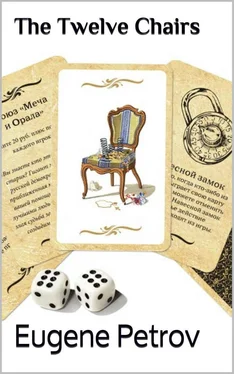Eugene Petrov - The Twelve Chairs
Здесь есть возможность читать онлайн «Eugene Petrov - The Twelve Chairs» весь текст электронной книги совершенно бесплатно (целиком полную версию без сокращений). В некоторых случаях можно слушать аудио, скачать через торрент в формате fb2 и присутствует краткое содержание. Год выпуска: 2013, Жанр: Юмористическая проза, на английском языке. Описание произведения, (предисловие) а так же отзывы посетителей доступны на портале библиотеки ЛибКат.
- Название:The Twelve Chairs
- Автор:
- Жанр:
- Год:2013
- ISBN:нет данных
- Рейтинг книги:5 / 5. Голосов: 1
-
Избранное:Добавить в избранное
- Отзывы:
-
Ваша оценка:
- 100
- 1
- 2
- 3
- 4
- 5
The Twelve Chairs: краткое содержание, описание и аннотация
Предлагаем к чтению аннотацию, описание, краткое содержание или предисловие (зависит от того, что написал сам автор книги «The Twelve Chairs»). Если вы не нашли необходимую информацию о книге — напишите в комментариях, мы постараемся отыскать её.
Find traces of a separate headset difficult and heroes face different adventures and troubles.
The Twelve Chairs — читать онлайн бесплатно полную книгу (весь текст) целиком
Ниже представлен текст книги, разбитый по страницам. Система сохранения места последней прочитанной страницы, позволяет с удобством читать онлайн бесплатно книгу «The Twelve Chairs», без необходимости каждый раз заново искать на чём Вы остановились. Поставьте закладку, и сможете в любой момент перейти на страницу, на которой закончили чтение.
Интервал:
Закладка:
After breakfast, the toughs with the brass tubes and the slender
knights with the Esmarch douches both made their way to the stern at the
same time. Galkin managed to get to the bench first. A clarinet from the
brass band came second.
"The seat's taken," said Galkin sullenly.
"Who by?" asked the clarinet ominously.
"Me, Galkin."
"Who else?"
"Palkin, Malkin, Chalkin and Zalkind."
"Haven't you got a Yolkin as well? This is our seat."
Reinforcements were brought up on both sides. The most powerful machine
in the band was the helicon, encircled three times by a brass serpent. The
French horn swayed to and fro, looking like a human ear, and the trombones
were in a state of readiness for action. The sun was reflected a thousand
times in their armour. Beside them the sound effects looked dark and small.
Here and there a bottle glinted, the enema douches glimmered faintly, and
the saxophone, that outrageous take-off of a musical instrument, was pitiful
to see.
"The enema battalion," said the bullying clarinet, "lays claim to this
seat."
"You," said Zalkind, trying to find the most cutting expression he
could, "you are the conservatives of music!"
"Don't prevent us rehearsing."
"It's you who're preventing us. The less you rehearse on those
chamber-pots of yours, the nicer it sounds."
"Whether you rehearse on those samovars of yours or not makes no damn
difference."
Unable to reach any agreement, both sides remained where they were and
obstinately began playing their own music. Down the river floated sounds
that could only have been made by a tram passing slowly over broken glass.
The brass played the Kexholm Lifeguards' march, while the sound effects
rendered a Negro dance, "An Antelope at the Source of the Zambesi". The
shindy was ended by the personal intervention of the chairman of the lottery
committee.
At eleven o'clock the magnum opus was completed. Walking backwards,
Ostap and Vorobyaninov dragged their transparent up to the bridge. The fat
little man in charge ran in front with his hands in the air. By joint effort
the transparent was tied to the rail. It towered above the passenger deck
like a cinema screen. In half an hour the electrician had laid cables to the
back of the transparent and fitted up three lights inside it. All that
remained was to turn the switch.
Off the starboard bow the lights of Vasyuki could already be made out
through the darkness.
The chief summoned everyone to the ceremonial illumination of the
transparent. Ippolit Matveyevich and the smooth operator watched the
proceedings from above, standing beside the dark screen.
Every event on board was taken seriously by the floating government
department. Typists, messengers, executives, the Columbus Theatre, and
members of the ship's company crowded on to the passenger deck, staring
upward.
"Switch it on!" ordered the fat man.
The transparent lit up.
Ostap looked down at the crowd. Their faces were bathed in pink light.
The onlookers began laughing; then there was silence and a stern voice from
below said:
"Where's the second-in-command?"
The voice was so peremptory that the second-in-command rushed down
without counting the steps.
"Just have a look," said the voice, "and admire your work!"
"We're about to be booted off," whispered Ostap to Ippolit Matveyevich.
And, indeed, the little fat man came flying up to the top deck like a
hawk.
"Well, how's the transparent?" asked Ostap cheekily. "Is it long
enough?"
"Collect your things!" shouted the fat man.
"What's the hurry?"
"Collect your things! You're going to court! Our boss doesn't like to
joke."
"Throw him out!" came the peremptory voice from below.
"But, seriously, don't you like our transparent? Isn't it really any
good?"
There was no point in continuing the game. The Scriabin had already
heaved to, and the faces of the bewildered Vasyuki citizens crowding the
pier could be seen from the ship. Payment was categorically refused. They
were given five minutes to collect their things.
"Incompetent fool," said Simbievich-Sindievich as the partners walked
down on to the pier. "They should have given the transparent to me to do. I
would have done it so that no Meyer-hold would have had a look-in!"
On the quayside the concessionaires stopped and looked up. The
transparent shone bright against the dark sky.
"Hm, yes," said Ostap, "the transparent is rather outlandish. A lousy
job!"
Compared with Ostap's work, any picture drawn with the tail of an
unruly donkey would have been a masterpiece. Instead of a sower sowing
bonds, Ostap's mischievous hand had drawn a stumpy body with a sugar-loaf
head and thin whiplike arms.
Behind the concessionaires the ship blazed with light and resounded
with music, while in front of them, on the high bank, was the darkness of
provincial midnight, the barking of a dog, and a distant accordion.
"I will sum up the situation," said Ostap light-heartedly. "Debit: not
a cent of money; three chairs sailing down the river; nowhere to go; and no
SPCC badge. Credit: a 1926 edition of a guidebook to the Volga (I was forced
to borrow it from Monsieur Simbievich's cabin). To balance that without a
deficit would be very difficult. We'll have to spend the night on the quay."
The concessionaires arranged themselves on the riverside benches. By
the light of a battered kerosene lamp Ostap read the guide-book:
On the right-hand bank is the town of Vasyuki. The commodities
despatched from here are timber, resin, bark and bast; consumer goods are
delivered here for the region, which is fifty miles from the nearest
railway.
The town has a population of 8,000; it has a state-owned cardboard
factory employing 520 workers, a small foundry, a brewery and a tannery.
Besides normal academic establishments, there is also a forestry school.
"The situation is more serious than I thought," observed Ostap. "It
seems out of the question that we'll be able to squeeze any money out of the
citizens of Vasyuki. We nevertheless need thirty roubles. First, we have to
eat, and, second, we have to catch up the lottery ship and meet the Columbus
Theatre in Stalingrad."
Ippolit Matveyevich curled up like an old emaciated tomcat after a
skirmish with a younger rival, an ebullient conqueror of roofs, penthouses
and dormer windows.
Ostap walked up and down the benches, thinking and scheming. By one
o'clock a magnificent plan was ready. Bender lay down by the side of his
partner and went to sleep.
CHAPTER THIRTY-FOUR
THE INTERPLANETARY CHESS TOURNAMENT
A tall, thin, elderly man in a gold pince-nez and very dirty
paint-splashed boots had been walking about the town of Vasyuki since early
morning, attaching hand-written notices to walls. The notices read:
On June 22,1927,
a lecture entitled
A FRUITFUL OPENING IDEA
will be given at the Cardboardworker Club
by Grossmeister (Grand Chess Master) O. Bender
after which he will play
A SIMULTANEOUS CHESS MATCH
on 160 boards
Admission . . . . . . . . . . . . . . . 20 kopeks
Participation. . . . . . . . . . . . . . 50 kopeks
Commencement at 6 p.m. sharp
Bring your own chessboards
MANAGER : K. Michelson
The Grossmeister had not been wasting his time, either. Having rented
the club for three roubles, he hurried across to the chess section, which
Читать дальшеИнтервал:
Закладка:
Похожие книги на «The Twelve Chairs»
Представляем Вашему вниманию похожие книги на «The Twelve Chairs» списком для выбора. Мы отобрали схожую по названию и смыслу литературу в надежде предоставить читателям больше вариантов отыскать новые, интересные, ещё непрочитанные произведения.
Обсуждение, отзывы о книге «The Twelve Chairs» и просто собственные мнения читателей. Оставьте ваши комментарии, напишите, что Вы думаете о произведении, его смысле или главных героях. Укажите что конкретно понравилось, а что нет, и почему Вы так считаете.












